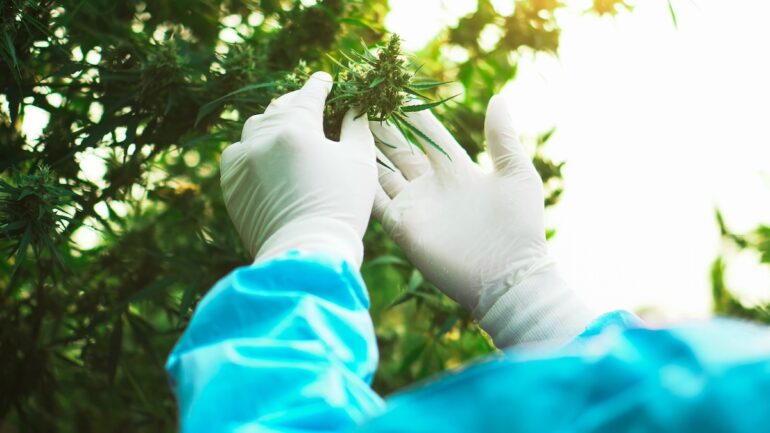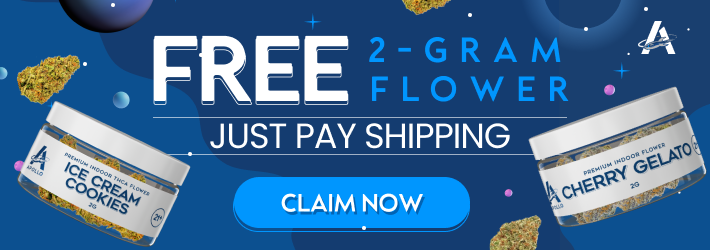Delta-8 THC, which is short for delta-8 tetrahydrocannabinol, is an intoxicating cannabinoid and isomer of THC.
Trace quantities of delta-8 are naturally present in cannabis, including hemp and marijuana. Delta-8 might also be considered a “synthetically derived” substance by the federal government if converted from concentrated CBD via a structural isomerization process using lab-grade acids.
Natural delta-8 in hemp is federally legal, while “synthetically derived” delta-8 exists in a federally legal gray area stuck between conflicting and confusing legislation.
Natural or Synthetic?
The debate over whether delta-8 is synthetic or not is ongoing. Delta-8 is considered natural and synthetically derived depending on how and where it’s sourced and who’s defining it, leaving many confused.
“It’s complicated,” Ben Cusack, Technical Project Manager at Precision Extraction Solutions, told CBD Oracle.
“Delta-8 occurs in minimal amounts, so harvesting enough raw plant material takes too much time, effort, and money. Fortunately, producers can convert delta-8 from concentrated CBD, which people often referred to as a synthetic process.”
Cusack’s insight is interesting, but is delta-8 the product of a synthetic process, and is it a synthetic cannabinoid by definition?
According to Dr. Erik Paulson, lab manager at InfiniteCAL Lab, there’s no question that delta-8 is a synthetic compound and legally classified as a Schedule I controlled substance. But Erik argues that the terminology needs to change to separate it from hemp-derived compounds and purely synthetic cannabinoids.
“Changing the chemical structure of a compound by adding one or more chemical reagents to change its structure is by definition a chemical synthesis. In this context, delta-8 is a synthetic compound and would then be legally classified as a Schedule I controlled substance,” he told us, adding:
“However, while delta-8 is clearly a synthetic cannabinoid from a legal perspective, some delineation from the classical terminology is required in the long-term, especially as state and federal regulatory changes continue. We should assign CBD and hemp-derived compounds the name ‘converted cannabinoids’, separating them from natural cannabinoids directly extracted from hemp and cannabis plants, as well as other synthetic organic compounds that interact with the endocannabinoid system.”
Paulson goes on to say that the term “converted cannabinoids” also avoids the ambiguity that exists with the term “hemp-derived cannabinoids” used in the AIA and other regulatory documents.
“It’s clear in the DEA’s Interim Final Rule that “derived” was to mean “sourced from”. Delta-8 proponents have interpreted this term to suggest that chemical derivatives or analogues of cannabinoids extracted from hemp are also legal. As it stands, delta-8 THC and other converted cannabinoids are in a unique position on the regulatory spectrum currently.”
How Is Delta-8 THC Made?
Natural delta-8 isn’t made, per se. It’s present in nearly all varieties of cannabis, which include hemp and marijuana. Delta-8 is the byproduct of THC degradation over time, but not the direct result of enzymatic synthesis. In other words, cannabis and its enzymes don’t create delta-8 the same way as CBD, CBG, or CBC.
Instead, delta-8 is formed when THC is exposed to the elements, including oxygen, heat, and UV radiation.
However, as Cusack explains above, only trace quantities of delta-8 naturally occur in cannabis (up to 1%). This percentage isn’t enough to effectively create delta-8 products, so processors need to get creative and think outside the box.
The most common way processors create effective delta-8 products is by converting delta-8 THC from concentrated CBD via an acid-catalyzed conversion process using chemicals under laboratory conditions.
Structural isomerization also happens after the hemp-derived CBD is converted into a mixture of delta-9 and delta-8. Chemists can alter the reagents used to favor the production of the delta-8 isomer. The resulting extract is then purified and tested for inconsistencies and contaminants.
What Are Synthetic Cannabinoids?
Synthetic cannabinoids (SCs) are a class of chemicals manufactured from scratch and designed to mimic the effects of natural cannabinoids.
They were initially for research purposes to better understand the endocannabinoid system, until word got out and illegal labs began replicating them.
Synthetic cannabinoids now belong to a group known as new psychoactive substances (NPS). Most NPS are heavily regulated and illegal under the Controlled Substances Act (CSA).
The bottom line is that synthetic cannabinoids behave differently from natural and semisynthetic cannabinoids like delta-8. Instead, this group of over 250 fully synthetic cannabinoids is considered wholly unsafe.
Spice and K2
Two of the most infamous synthetic cannabinoids in the NPS group are “K2” and “Spice,” both of which mimic the effects of THC and delta-8. They became a commonly used designer drug during the early 2000s. Most illicit K2 and Spice products are imported illegally from overseas.
K2 and Spice are often sprayed onto plant material, sometimes even marijuana, for more intense effects. They’re also brewed in teas or used in vape liquids. When consumed, they act on cannabinoid 1 (CB2) and cannabinoid 2 (CB2), the same receptors THC and delta-8 bind to.
However, K2 and Spice are not the same as THC or delta-8. Their effects are considered extraordinarily intense and potentially life-threatening. Some may bind to CB1 over 100 times stronger than delta-9 THC. Delta-9 is also just a partial agonist while SCs are full agonists, meaning they are stronger and more difficult to turn off.
K2, Spice, and other synthetic cannabinoids are 30-times more likely to cause an ER trip than regular marijuana. Consumption can result in serious, multi-system side effects like psychosis, seizures, extreme anxiety, heart attacks, organ failure, metabolic derangement, or strokes.
Delta-8 is not a fully synthetic cannabinoid, nor is it anything like K2 or Spice. We know enough about delta-8 pharmacology to affirm it is a relatively safer, partial agonist with weak psychoactivity.
What Are Semisynthetic Cannabinoids?
Semisynthetic cannabinoids are different from synthetic cannabinoids. They retain the same molecular structure as natural cannabinoids but are made from the conversion of other cannabinoids. The key difference is the starting point.
Semisynthetic cannabinoids are made from natural cannabinoids (i.e. CBD) vs. synthetic cannabinoids (SCs) are made entirely from scratch chemicals with a different recipe and goal in mind.
The main advantage of semisynthetic cannabinoids is their effects on your body are already understood and somewhat predictable. In contrast, synthetic cannabinoids are vastly unpredictable and dangerous, which is why semi-synthetics are preferred over full synthetics.
There’s some debate around whether delta-8 is the product of a technically synthetic process, though we believe this isn’t strictly the case and doesn’t tell the whole story.
Key Takeaways
Delta-8 is not synthetic, but it can be made into a semisynthetic product when converted from CBD through an isomerization process.
Delta-8 is naturally present in all varieties of cannabis. In fact, studies show people actually use delta-8 to quit using SCs and other drugs.
However, the confusion comes when delta-8 is converted from naturally sourced CBD via an acid-catalyzed process using chemicals.
The federal government believes this is a hemp derivative from a synthetic process, while others inside the cannabis industry claim it’s not actually a synthetic process, simply because a natural cannabinoid is converting into another natural cannabinoid.
References
- Geci, M., Scialdone, M., & Tishler, J. (2023). The Dark Side of Cannabidiol: The Unanticipated Social and Clinical Implications of Synthetic Δ8-THC. Cannabis and Cannabinoid Research, 8(2), 270–282. https://doi.org/10.1089/can.2022.0126
- Golombek, P., Müller, M., Barthlott, I., Sproll, C., & Lachenmeier, D. W. (2020). Conversion of Cannabidiol (CBD) into Psychotropic Cannabinoids Including Tetrahydrocannabinol (THC): A Controversy in the Scientific Literature. Toxics, 8(2), 41. https://doi.org/10.3390/toxics8020041
- Kruger, D. J., & Kruger, J. S. (2023). Consumer Experiences with Delta-8-THC: Medical Use, Pharmaceutical Substitution, and Comparisons with Delta-9-THC. Cannabis and Cannabinoid Research, 8(1), 166–173. https://doi.org/10.1089/can.2021.0124
- Kruger, J. S., & Kruger, D. J. (2022). Delta-8-THC: Delta-9-THC’s nicer younger sibling? Journal of Cannabis Research, 4(1), 4. https://doi.org/10.1186/s42238-021-00115-8
- Reber, J. D., Karschner, E. L., Seither, J. Z., Knittel, J. L., Dozier, K. V., & Walterscheid, J. P. (2022). An Enhanced LC–MS-MS Technique for Distinguishing Δ8- and Δ9-Tetrahydrocannabinol Isomers in Blood and Urine Specimens. Journal of Analytical Toxicology, 46(4), 343–349. https://doi.org/10.1093/jat/bkac007
- Russo, F., Vandelli, M. A., Biagini, G., Schmid, M., Luongo, L., Perrone, M., Ricciardi, F., Maione, S., Laganà, A., Capriotti, A. L., Gallo, A., Carbone, L., Perrone, E., Gigli, G., Cannazza, G., & Citti, C. (2023). Synthesis and pharmacological activity of the epimers of hexahydrocannabinol (HHC). Scientific Reports, 13(1), Article 1. https://doi.org/10.1038/s41598-023-38188-5
- Tagen, M., & Klumpers, L. E. (2022). Review of delta-8-tetrahydrocannabinol (Δ8-THC): Comparative pharmacology with Δ9-THC. British Journal of Pharmacology, 179(15), 3915–3933. https://doi.org/10.1111/bph.15865
Last medically reviewed on November 22, 2023

